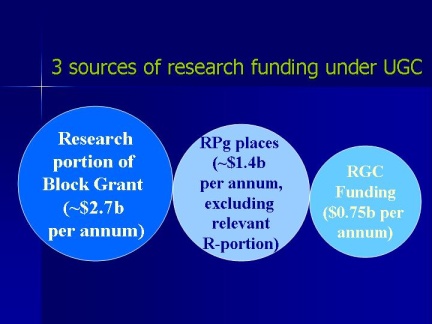
|
|
|
|
|
|
|
|
|
|
Institutions all over the world are working assiduously to excel in their academic research, in the hope to advance development and strive to be the leading ones in the international research community. Hong Kong institutions have to adjust their strategy by adopting the best practice overseas, and to gear up to facing the intensified challenges from the region and the rest of the world. Nowadays, all economies have concentrated their resources on the best quality research projects, and looking for breakthroughs. Hong Kong should follow the footsteps of the international community and engage in cutting edge research with a view to nurturing elites in Hong Kong. Competition Drives Excellence It is a pleasure to see that research development of our institutions have progressed beyond the nascent stage some 20 years ago. Many of our researchers and outstanding students are conducting world-class research today. Hong Kong however should not be complacent. We have to keep abreast of time and make reference to what our counterparts are doing in research funding allocation. The University Grants Committee (UGC) is planning the improvement of the existing funding mechanism by linking research funding with top quality research so as to enhance the competitiveness of our institutions. Allocation of Research Resources The UGC has all along supported the institutions in academic research. There are three main sources to fund institutions’ research work, namely:
New Funding Arrangement The UGC proposes to transfer almost half, or $1.3 billion, of the “R portion” to the “RGC funding” for competitive allocation over a few years. It will be awarded as “on-costs” of the funded projects, which will be returned to the institutions for their deployment and funding research related expenditure, such as part of the salary, general infrastructure, equipment and other administrative costs. In other words, the Head of Institution will have full freedom to decide how to allocate the funds. The amount of on-costs to be allocated will depend on the number of successful projects granted. That is to say, if an institution is very successful in these project competitions, the institution will gain more on-costs funding, and vice versa. In a nutshell, the whole amount of $1.3 billion RGC funding is all for research work, and at the full disposal of heads, and not directly allocated for use by the academics on individual projects. The new funding arrangement is to enhance the competitive element in Hong Kong’s research and to advocate a balanced funding model – partly competitive and partly secure. The new policy serves to improve the allocation of research funding and to proactively underpin the development of research in Hong Kong Professor Roland Chin |
